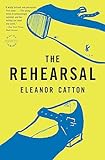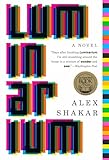
1.
My first novel was published in Italy a couple of months back, and a short time later a list of questions from an Italian journalist appeared in my inbox. Most of the questions involved the plot, imagery, themes, etc., and then came one that I’ve been thinking about ever since. The journalist referenced a line she’d liked from the book, concerning a troubled character’s suspicion that the world might eventually prove to be either a mirage or possibly an elaborate hoax. She followed this up with her question: “Do you believe, or fear, that the world is a mirage, or a hoax?”
Of course the first instinct is denial, because doesn’t one always want to look like the absolute paradigm of mental health when there’s a journalist involved? Especially when said journalist is about to translate your answer into a language you don’t speak, thus exponentially increasing the odds of misinterpretation? I do, anyway. So no! Not at all! Of course I don’t think the world is a mirage or a hoax! What an interesting question, but that was just my character talking!
And yet the question stayed with me in the weeks that followed. I don’t believe that the world is a mirage or a hoax. It did occur to me a few days ago that there’s something in the question that speaks to the process of writing fiction — these mirages that we’re always trying to write.
But I don’t think it’s just my profession. I don’t think the question lingers solely because I write fiction. I think there’s something in the question that brushes up against the fleeting interludes of disorientation that I suspect most adults are susceptible to. Those odd moments when you look up and think, “Is this really my life? How did this happen?” (“Can you believe we have a kid?” a friend asked a few years ago, when we came over to see a new baby for the first time. “Can you believe this is us?”)
Or the moments of alienation. “I’m a stranger in a strange land,” someone close to me said once, drunk late one night in the country where he’d been born and raised, and I understood what he meant. The way the entire world can seem foreign sometimes.
2.
The question made me realize that I’ve read a great many books these past few years where reality was either malleable or in question. Without further ado, here’s a slightly disorienting reading list:
 The Rehearsal by Eleanor Catton
The Rehearsal by Eleanor Catton
An interesting and slippery novel concerned, in part, with the idea of life as performance. A scandal has erupted at an all-girls high school. One of the students has had an affair with a teacher. The local drama school decides to turn the story of the scandal into their year-end show, and this is where the lines between theatre and reality begin to blur. Catton keeps us on our toes: some sections read as though they’re really happening in the world of the book, while other sections are blatantly theatrical — the same cast of characters, but with exaggerated dialogue and background music — and in others it’s difficult to tell, at first: scenes that seem as though they might be real, whatever real means in the context of a novel, are interrupted by lighting cues.
 Ready Player One by Ernest Cline
Ready Player One by Ernest Cline
I picked this book up one early evening when I was home alone, thinking I’d just read it for an hour before dinner. I was still reading at three a.m. I went to bed for six hours, then got up to finish it. Cline presents us with an extraordinarily bleak future. It is 2044, and civilization is in a state of collapse. Most of the population spends most of their waking hours plugged into OASIS, a virtual reality that’s considerably more pleasant than real life. Wade Watts is a desperately poor teenager who only feels alive when he’s plugged in. But he becomes increasingly immersed in solving a series of puzzles that the creator of OASIS hid in the program, and reality and OASIS begin to overlap.
 Mr. Peanut by Adam Ross
Mr. Peanut by Adam Ross
David Pepin loves his wife, Alice. Also, he dreams of killing her, and when she turns up dead he’s the prime suspect. Mr. Peanut is a truly harrowing vision of marriage; not just the Pepins’, but the marriages of the two detectives assigned to the case. David Pepin, the detectives discover, may have ties to a mysterious and sinister hitman named Mobius. But David Pepin is writing a book; in the book, which doesn’t have an ending yet, there’s a Mobius and an Alice and a David too. What really happened to Alice? Is Mobius real? Reading Mr. Peanut is like falling down a rabbit hole.
 Luminarium by Alex Shakar
Luminarium by Alex Shakar
Fred’s twin brother George has been in a coma for six months. Before George was diagnosed with terminal lymphoma and slipped into unconsciousness, they were co-CEOs of a software company that created virtual reality disaster simulations for a military subcontractor. Their younger brother continues their work, creating increasingly real-looking simulations of disasters, while Fred keeps watch over George in the hospital. Fred’s limbo becomes stranger after he begins to receive emails that appear to come from his comatose brother.
Image via Iragerich/Flickr









